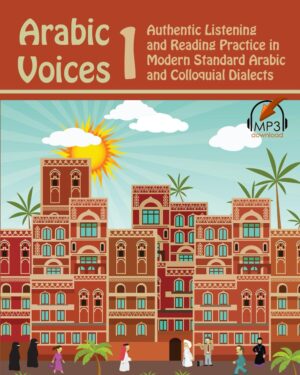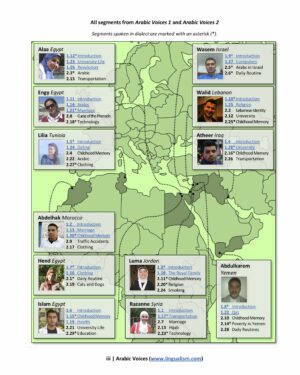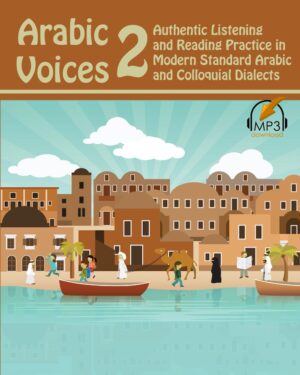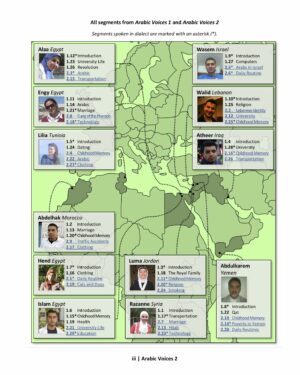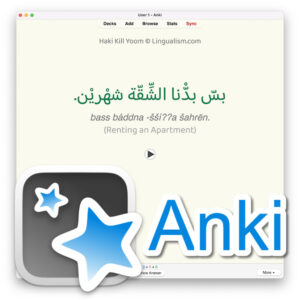Home » Modern Standard Arabic » Marriage in Morocco–Abdelhak
Marriage in Morocco–Abdelhak
| Greetings! [00:00] | السلام عليكم ورحمة الله وبركاته. | |
| Welcome to a new Arabic Voices video, your path to learning Arabic. [00:03] | أهلاً ومرحبًا بكم في فيديو جديد من فيديوهات Arabic Voices طريقك لتعلم العربية. | |
| Today we will talk about what Abdelhak said about marital life in Morocco and the situation of young men and women in Morocco. [00:11] | سنتحدّث اليوم عمّا قاله عبد الحق بشأن الحياة الزوجية في المغرب، وحال الشّباب والفتيات في المغرب. | |
| Let's start on page 68, specifically on line 2. Abdelhak says, "...which urges marriage in addition to contributing to the social balance." [00:23] | فهيّا بنا نبدأ في الصفحة الثامنة والستون، وتحديدًا في السطر الثاني—يقول عبد الحق: (الذي يحثّ على الزواج بالإضافة إلى المساهمة في التوازن الاجتماعي). | |
| Abdelhak uses the verb 'urges', and the verb 'urges' in the sense 'encourages.' [00:40] | فيستخدم عبد الحق هنا الفعل [يحثّ على]، والفعل [يحثّ على] بمعنى [يشجع على]، | |
| Abdelhak says, "Religious persuasion encourages marriage, religious bias encourages marriage." [00:51] | فيقول عبد الحق أن: (الوازع الديني يحثّ على الزواج، الوازع الديني يشجع على الزواج). | |
| You can use 'urge' or 'encourage', but remember when you use the verb 'encourages' or the verb يشجع ... [01:00] | يمكنك أن تستخدم [يحثّ على] أو [يشجع على]، ولكن تذكر عندما تستخدم الفعل [يشجع] أو الفعل يحثّ على... | |
| ... or the verb يحثّ, sorry, you have to use the preposition على with this verb. [01:10] | أو الفعل [يحثّ] عفوًا، فلا بدّ أن تستخدم حرف الجر [على] مع هذا الفعل. | |
| You say, for example, "Writing encourages creativity. Writing urges a novelty. The goal urges action. The goal encourages action." [01:17] | تقول مثلًا: (الكتابة تشجع على الا بدّاع—الكتابة تحثّ على الا بدّاع—الهدف يحثّ على العمل—الهدف يشجع على العمل). | |
| Both words have the same meaning. [01:35] | [يحثّ على—يشجع على] كلاهما بمعنا واحد. | |
| Great! Let's move on to the next point about what Abdelhak said on line 4. [01:42] | عظيم! هيّا إذا ننتقل إلى النقطة التالية وهي بشأن ما قاله عبد الحق في السطر الرابع—يقول عبد الحق: | |
| "But in Morocco, and especially recently, Moroccan society has known a terrible reluctance to marry." [01:55] | (ولكن في المغرب وبصفة خاصة، مؤخرًا، عرف المجتمع المغربيّ عزوفًا رهيبًا على الزواج). | |
| Abdelhak says here that although marriage gives rise to hopes and a desire to live–which he said on line 3– [02:06] | فيقول عبد الحق هنا أنه بالرغم من أن الزواج يبعث إلى الآمال والرغبة في الحياة—وهو ما قاله في السطر الثالث— | |
| in Morocco, and in particular, Moroccan society has known a terrible reluctance to marry. [02:17] | ولكن في المغرب وبصفة خاصة عرف المجتمع المغربيّ عزوفًا رهيبًا على الزواج. | |
| Abdelhak uses the word ولكن (however, but) to mention something that contradicts or differs from what he has said before. [02:26] | فيستخدم عبد الحق هنا كلمة [ولكن] لذكر شيء يتناقض، أو يختلف عما قاله من قبل؛ | |
| Although marriage inspires hopes and a desire for life, on the contrary, Morocco, in particular, has known a reluctance to marry. [02:36] | بالرغم من أن الزواج يبعث إلى الآمال والرغبة في الحياة، ولكنعلى النقيض من ذلك، المغرب وبصفة خاصة عرف عزوفا عن الزواج. | |
| So, you use the word ولكن (however, but) to connect something different from what you said in the previous sentence. [02:52] | فكلمة [ولكن] تستخدمها للربط بين شيء يختلف عما قلته في الجملة السابقة؛ | |
| You say, for example, "Sports are useful; however, I am too busy to play sports–but I am too busy." [03:01] | فتقول مثلًا: (الرياضة مفيدة، ولكن أنا مشغول جدًا فلا أمارس الرياضة—ولكن أنا مشغول جدًا…) | |
| You know that sports are useful, but you are too busy to do sports. [03:12] | أنت تعرف أن الرياضة مفيدة، ولكن أنت مشغول جدًا فلا تمارس الرياضة. | |
| The word ولكن here is used to link... a sentence that differs from what I said in the previous sentence. [03:19] | كلمة [ولكن] هنا تستخدم للربط بين... جملة تختلف عما قلته في الجملة السابقة. | |
| You can say, for example, "Music is beautiful, but I do not listen to music much." [03:31] | يمكنك مثلًا أن تقول: (الموسيقى جميلة، ولكني لا أستمع إلى الموسيقى كثيرًا... | |
| The music is beautiful, but I do not listen to music much. [03:40] | الموسيقى جميلة، ولكني لا أستمع إلى الموسيقى كثيرًا. | |
| Great! The ... ولكن... this tool is used to link something that is different from what you said before. [03:46] | عظيم! فحرف...[ولكن] هذه الأداة تستخدم للربط بين شيء يختلف عما قلته من قبل. | |
| Great! Let's move on to the next point, namely on line 6, Abdelhak says, [03:56] | عظيم! هيا ننتقل إذًا إلى النقطة التالية، وهي تحديدًا في السطر السادس—يقول عبد الحق: | |
| "...whereas a proportion... whereas a large proportion of young people suffer so much to get job opportunities that spare them from unemployment." [04:08] | (حيث أن نسبة… حيث أن نسبةً كبيرةً من الشباب تعاني كثيرًا من أجل الحصول على فرص شغل تنقذهم من البطالة). | |
| Abdelhak uses here the verb نقذ (save); so, he uses the verb to mean that these... these job opportunities... these job opportunities save young people from unemployment; that is, they protect them from unemployment–'saves' in a protective sense. [04:21] | يستخدم عبد الحق هنا فعل [ينقذ] نقذ ينقذ، فيستخدم هذا الفعل ليعني أنها هذه... فرص العمل هذه، فرص الشغل هذه تنقذ الشباب من البطالة؛ أي تحميهم من البطالة، [ينقذ] بمعنى يحمي. | |
| You can say, for example: "The coach saved the child from drowning." ينقذ من (saves from)... [04:47] | فيمكنك أن تقول مثلًا: (المدرب أنقذ الطفل من الغرق) ينقذ من... | |
| Remember that you have to use the preposiiton من (from) with the verb ينقذ. [04:58] | تذكر أنه لا بدّ أن تستخدم حرف الجر [من] مع الفعل [ينقذ]. | |
| You can say, for example, "Work saves you from laziness. Reading saves you from ignorance." And so on... [05:05] | يمكنك أن تقول مثلًا: (العمل ينقذك من الكسل—القراءة تنقذك من الجهل)، وهكذا... | |
| Abdelhak says here, "Job opportunities save young people from unemployment. Work saves you from poverty." and so on... ينقذ من [05:18] | يقول عبد الحق هنا أن: (فرص العمل تنقذ الشباب من البطالة—العمل ينقذك من الفقر)، وهكذا... [ينقذ من]. | |
| Great! Then on line 9, Abdelhak says, "In fact, the reluctance to marry is more often related to financial and material reasons than returning to what is ideological." [05:30] | عظيم! بعد ذلك في السطر التاسع—يقول عبد الحق: (في الواقع يرتبط العزوف عن الزواج في الغالب الأعمّ بأسباب مالية ومادية أكثر من رجوعها إلى ما هو إيديولوجيّ). | |
| Abdelhak uses the word or expression here في الغالب الأعمّ (mostly), 'more often than not.' This expression means 'usually.' [05:48] | فيستخدم عبد الحق هنا كلمة أو مصطلح [في الغالب الأعمّ]، وفي الغالب الأعمّ هي... هذا المصطلح بمعنى [غالبًا]. | |
| We have explained that غالبًا (often) or 'most of the time.' [06:01] | وكنا قد شرحنا [غالبًا] من قبل كلمة [غالبًا] أي في معظم الأحيان؛ [في معظم الأحيان، غالبًا، في الغالب الأعمّ]. | |
| And the word or expression في الغالب الأعمّ (mostly) is more formal than just saying في الغالب. [06:09] | وكلمة أو مصطلح [في الغالب الأعمّ] هو مصطلح أكثر فصحى من فقط أن تقول [في الغالب]. | |
| You can say في الغالب without mentioning the word الأعمّ, but في الغالب الأعمّ is more formal and eloquent than just saying في الغالب. [06:19] | يمكنك أن تقول [في الغالب] بدون ذكر كلمة [الأعمّ] ولكن [في الغالب الأعمّ] هو مصطلح أكثر فصحىوبلاغة من فقط أن تقول [في الغالب]. | |
| You can say, for example, "I often go to the library ... I'm often in the library." 'Mostly' in the sense of 'often.' [06:32] | يمكنك أن تقول مثلًا: (أنا في الغالب أذاكر بالمكتبة… أنا في الغالب أذاكر في المكتبة)، [في الغالب] بمعنى [غالبًا]. | |
| If you say في الغالب الأعمّ, it is more eloquent. You use it when you speak in Standard Arabic, in... [06:44] | وإذا قلت [في الغالب الأعمّ] فيكون هذا أكثر بلاغة، تستخدمه عندما تتحدّث بلغة عربية فصحى، في... | |
| It is more eloquent; it is more eloquent. [06:56] | هو أكثر فصاحة، هو أكثر بلاغة. | |
| في الغالب is also formal, but في الغالب الأعمّ it is more eloquent. [06:59] | [في الغالب] كذلك فصحى ولكن [في الغالب الأعمّ] هو أكثر فصاحة أو بلاغة. | |
| For example, you can say, "I mostly read Arabic books" three ways. [07:05] | فمثلًا يمكنك أن تقول: (أنا في الغالب أقرأ الكتب العربية—أنا غالبًا أقرأ الكتب العربية—أنا في الغالب الأعمّ أقرأ الكتب العربية). | |
| All of them have the same meaning. [07:18] | [في الغالب، في الغالب الأعمّ، غالبًا] كلهم بمعنا واحد. | |
| Great! Let's move on to the next point, specifically on line 12. ... [07:27] | عظيم! هيا ننتقل إذًا إلى النقطة التالية، وتحديدًا في السطر الثاني عشر… | |
| on line 12, Abdelhak says, "Finding a dwelling is one of the seven impossibilities." [07:38] | في السطر الثاني عشر—يقول عبد الحق: (أمّا إيجاد مسكن فذلك أصبح من السبع مستحيلات) | |
| This is a beautiful expression that we use in MSA. [07:47] | وهذا مصطلح جميل نستخدمه في اللغة العربية الفصحى. | |
| It means that you can't do this thing at all. [07:52] | ويعني أنه لا يمكنك أداء هذا الشيء على الإطلاق؛ | |
| When you say that something is one of the Seven Impossibilities, then it is something you will not try to do. [07:57] | عندما تقول أن شيء من السبع مستحيلات أو من سابع المستحيلات فهذا شيء لا تحاول أن تفعله. | |
| Here, Abdelhak says that finding a home has become one of the seven impossibilities. It means something you wouldn't even dream of doing it. [08:06] | يقول هنا عبد الحق أن إيجاد مسكن أصبح من السبع المستحيلات؛ يعني هذا شيء لا تحلم حتى بأدائه. | |
| For example, you can say, "If your income is a thousand dollars, then it is seven impossibilities to build a house, or buy a house in one year,' for example. [08:15] | يمكنك أن تقول مثلًا: (إذا كان دخلك ألف دولار، فمن السبع مستحيلات أن تبني بيتا، أو تشتري بيتا في عامواحد) مثلًا. | |
| This is one of the seven impossibilities, i.e. something that you cannot do at all 'from the seven impossibilities' or 'from the seventh of the impossibilities.' [08:28] | فهذا من السبع مستحيلات، أي أمر لا يمكنك أدائه على الإطلاق [من السبع مستحيلات] أو [من سابع المستحيلات]. | |
| The last point in particular on line 18. Abdelhak says, "The moral decay that is taking place within families through the poison of the media in which all forms of values and principles are absent." [08:41] | النقطة الأخيرة تحديدًا في السطر الثامن عشر—يقول عبد الحق: (إن الإنحلال الأخلاقي الذي بات يسري داخل الأسر من خلال سموم الإعلام الذي تغيب فيه كل أشكال القيم والمبادئ). | |
| Abdelhak here uses the expression من خلال (through, via). This term is used to express the means used to carry out or do something. [09:02] | يستخدم عبد الحق هنا مصطلح [من خلال... من خلال… ومن خلال]هذا المصطلح يستخدم للتعبير عن الوسيلة التي تستخدم لأداء أو لفعل شيء ما. | |
| من خلال also means عن طريق. You can use either one with the same meaning, and use either of them to express the means you use to carry out something. [09:23] | [من خلال] وهي تعني كذلك [عن طريق] يمكنك أن تستخدم [من خلال أو عن طريق] بمعنا واحد، وتستخدم أيًا منهما للتعبير عن الوسيلة التي تستخدمها لأداء شيء ما. | |
| For example, Abdelhak says here, "The moral decay that is taking place within families through the poisons of the media." The means are the poisons of the media, and it is through the poisons of the media that this happens. [09:42] | فمثلًا يقول هنا عبد الحق: (الإنحلال الأخلاقي الذي بات يسري داخل الأسر من خلال سموم الإعلام)، الوسيلة هي سموم الإعلام فمن خلال سموم الإعلام هذا يحدث. | |
| For example, you can say, “Writing gets better with practice.” The means is practice. Writing gets better via practice. [09:56] | يمكنك أن تقول مثلًا: (الكتابة تتحسن من خلال الممارسة)، فالوسيلة هي الممارسة، الكتابة تتحسن عن طريق الممارسة. | |
| Both have the same meaning, and both are used to express the means you use to do something, or to achieve an end. [10:08] | [من خلال، عن طريق] كلاهما بمعنا واحد، وكلاهما يستخدم للتعبير عن الوسيلة التي تستخدمها لفعل شيء ما، أو لتحقيق هدفٍ ما. | |
| With this, we have finished commenting on what Abdelhak said. [10:24] | وبهذا نكون قد انتهينا منالتعليق عمّا قاله عبد الحق. | |
| I hope you have benefited from this video. [10:30] | أتمنى أن تكونوا قد استفدتم من هذا الفيديو. | |
| Thank you very much, and see you in another video. May the peace, mercy and blessings of God be upon you. [10:33] | أشكركم شكرًا جزيلًا، و ألقاكم على خير في فيديو آخر، والسلام عليكم ورحمة الله وبركاته. |
Video Lessons
Arabic Voices MSA Lessons
Arabic teacher Mostafa Ahmed takes us through segments in MSA from Lingualism's book Arabic Voices 1: Authentic Listening and Reading Practice in Modern Standard Arabic and Colloquial Dialects, explaining interesting points of grammar and vocabulary.

